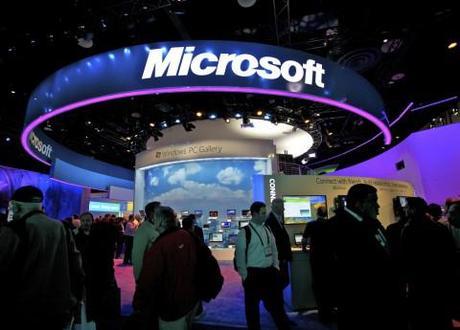
Microsoft's booth at CES 2011. Photo credit: TechCocktail, http://www.flickr.com/photos/techcocktail/5341915090/
Just as it has every winter since 1978, Las Vegas will fill to the bursting with eager young technophiles, stalwarts of the electronics industry, and more slick new gadgets than can fill a teenager’s birthday wishlist, as it plays host to the Consumer Electronics Show next week.
But this year, a pall hangs over the industry’s most important gadget expo. Following tech giant Microsoft’s December 21 announcement that 2012 would be its last keynote address and booth and a mounting record of inaccurate trend predictions, observers are wondering whether the show still has any relevance. Though the show is expected to bring in more than 140,000 visitors, most of them industry insiders and journalists, as well as 2,800 exhibitors, little exciting or market-shattering has come out of CES in years.
The question everyone’s asking. Microsoft’s decision has certainly generated a lot of pre-show publicity for CES, but it is unlikely to be the kind hoped for by the organisers. Headlines include “Is this the end of CES?” from Mashable, PCWorld’s “Has the world’s largest gadget fair lost its mojo?” and “CES: The End of an Era” from TechNewsWorld. The consensus seems to be “maybe” – CES “still sets the stage for the year in electronics”, Jay Alabaster at PCWorld claimed, but Mashable‘s Lance Ulanoff said that he’d be walking the acres of gadgetry, trying to figure out if the show really is over.
The ‘curse’ of CES. But CES has been floundering well before Microsoft’s announcement, Peter Svensson of the Associated Press noted, claiming that the show is “quickly becoming a launch pad for products that fall flat.” In 2011, for example, more than 100 brands of tablet computers were on display – yet they barely made a dent in Apple’s massive market share. And speaking of Apple, Svensson noted, it’s the absence of “the company that has been driving trends in the industry” that is part of that “curse”. With Microsoft seemingly adopting the same strategy, all that will be left are “companies that don’t quite have the clout or money to draw people to its own events, plus ones that put out new products at a reliable annual pace, such as TV and car makers”.
What’s notable this year: PC makers are bringing out their answer to the MacBook Air with “ultrabooks”; more “smart” Internet-connected TVs that also do 3D; crazy-thin TVs; a Windows 8 tablet; and connectedness in everything from your refrigerator to your car.
More notable absences. Dell left four years ago, Hewlett-Packard has scaled back involvement and the Verizon CEO will not be appearing this year. Analyst Charles S Golvin told the New York Times blog Bits that companies may well have re-evaluated their return on investment: “It’s easy to be crushed on the tidal wave of C.E.S. news, difficult to stand out, and in some cases, promises lead to disappointment.” It could be worse; Toshiba, Sony, Acer, Asus still seem to be committed, as do Samsung and Panasonic.
Bad timing. It doesn’t take an industry expert to realize that the first week of January is a terrible time to introduce a product, the best being mid-year to allow for major campaigns for Christmas. PC World’s Alabaster noted that even with many products to “trigger our technolust”, since most big brands have already launched their gadgets (Sony’s Vita gaming console, the latest iPhone, Amazon’s Kindle Fire) “the halcyon years of new must-have items” at CES might be over. Despite the fact that vendors often hold back hot products until later in the year, the organisers appear to have no intentions to reschedule.
ABC News reported that the CEO of the Consumer Electronics Organisation, which sponsors the show, isn’t worried. “I’m pretty comfortable that we’re the most important event for technology in the world,” said Gary Shapiro. “It’s difficult to come out with someone really important who’s not there”.
Is networking enough? One reason that CES is still popular (attendance is set to increase again this year) is the networking opportunities presented by so many industry professionals being in the same place at the same time. Tim Barjarin at PCMag highlighted the trend of renting private suites to hold meetings in rather than booking booths at the show, which Microsoft will be doing as of next year, and concluded that for this reason CES is “the one trade show that has real staying power”. However, Forbes‘ Roger Kay slammed those who do this as “parasitic vendors” – saving themselves the huge fees for booths and carefully preparing guest lists for private meetings rather than wasting time on “any industry spy, college student or random hanger on”.
The next step. Many commentators are sceptical of CES’s ability to continue in this vein for much longer. Up until now the show has been growing, but Jeff Kagan at TechNewsWorld believes that it won’t continue to do so unless it rebrands, as other companies will follow in Microsoft’s footsteps. “But then again, who cares?” asked Don Reisinger at SlashGear. “The show is fun, but if we lose it and the countless other shows the industry has succeed because of it, will we really be missing out? I don’t think so.”
More in tech
- iPad3: The rumours
- The year’s most talked about gadgets
- Apple to launch smaller iPad. Maybe.

